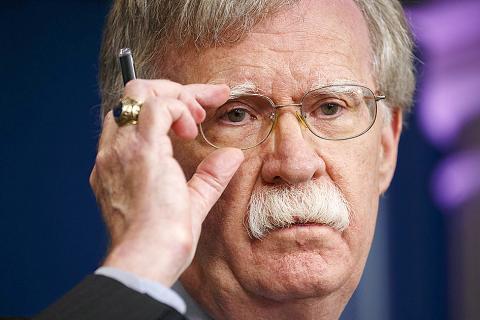Chinese provocations will not win Taiwanese hearts, but will only bring people around the world that cherish democracy closer, White House National Security Adviser John Bolton said in a tweet yesterday.
“Chinese military provocations won’t win any hearts or minds in Taiwan, but they will strengthen the resolve of people everywhere who value democracy. The Taiwan Relations Act [TRA] and our commitment are clear,” Bolton wrote.
Bolton did not elaborate on the US’ commitment to Taiwan.

Photo: Bloomberg
According to the TRA, which serves as the basis of unofficial relations between Taiwan and the US, Washington is obliged to provide Taiwan with defensive weapons.
It must also “maintain the capacity of the United States to resist any resort to force or other forms of coercion that would jeopardize the security, or the social or economic system, of Taiwan’s people,” the act says.
Minister of Foreign Affairs Joseph Wu (吳釗燮) thanked Bolton for his “unwavering friendship and support” in a tweet.
“We’re determined to deal with any reckless military adventure by the bully across the #Taiwan Strait. Provocation only makes us stronger & as you said: ‘Surrender is not an option,’” Wu wrote.
Bolton’s comments came after two Chinese People’s Liberation Army Air Force fighter jets crossed the median line of the Taiwan Strait on Sunday, a rare move that breached a long-held tacit agreement between the two sides.
Military sources said it was the first time since 1999 that the Chinese military had intentionally crossed the median line that separates Taiwan and China.
Commenting on the incident, Pentagon spokesman Lieutenant Colonel Dave Eastburn said the US opposes unilateral actions by any party aimed at altering the cross-strait “status quo,” including “any resort to force or other forms of coercion.”
“Consistent with the Taiwan Relations Act, the United States considers any effort to determine the future of Taiwan by other than peaceful means, including by boycotts or embargoes, of grave concern to the United States,” he said.
The Ministry of National Defense said that the air force scambled five fighter jets to intercept two Chinese J-11 fighter planes that crossed the median line and entered Taiwan’s southwestern airspace at 11am on Sunday.
The J-11 aircraft eventually returned to the Chinese side of the median line after receiving multiple radio warnings.
Ian Easton, a research fellow with the US-based think tank Project 2049 Institute, said the provocation was “further evidence that [Chinese President] Xi Jinping (習近平) is an aggressive and ambitious militarist.”
He said it was a good sign that Washington is beginning to realize Beijing’s threat to Taiwan and to the whole Indo-Pacific region.

Tropical Storm Gaemi strengthened into a typhoon at 2pm yesterday, and could make landfall in Yilan County tomorrow, the Central Weather Administration (CWA) said yesterday. The agency was scheduled to issue a sea warning at 11:30pm yesterday, and could issue a land warning later today. Gaemi was moving north-northwest at 4kph, carrying maximum sustained winds near its center of up to 118.8kph and gusts of 154.8kph. The circumference is forecast to reach eastern Taiwan tomorrow morning, with the center making landfall in Yilan County later that night before departing from the north coast, CWA weather forecaster Kuan Shin-ping (官欣平) said yesterday. Uncertainty remains and

SEA WARNING LIKELY: The storm, named Gaemi, could become a moderate typhoon on Wednesday or Thursday, with the Taipei City Government preparing for flooding A tropical depression east of the Philippines developed into a tropical storm named Gaemi at 2pm yesterday, and was moving toward eastern Taiwan, the Central Weather Administration (CWA) said. Gaemi could begin to affect Taiwan proper on Tuesday, lasting until Friday, and could develop into a moderate typhoon on Wednesday or Thursday, it said. A sea warning for Gaemi could be issued as early as Tuesday morning, it added. Gaemi, the third tropical storm in the Pacific Ocean this typhoon season, is projected to begin moving northwest today, and be closest to Taiwan on Wednesday or Thursday, the agency said. Today, there would likely

DISRUPTIONS: The high-speed rail is to operate as normal, while several airlines either canceled flights or announced early departures or late arrivals Schools and offices in 15 cities and counties are to be closed today due to Typhoon Gaemi, local governments announced last night. The 15 are: Taipei, New Taipei City, Taoyuan, Tainan, Keelung, Hsinchu and Kaohsiung, as well as Yilan, Hualien, Hsinchu, Miaoli, Chiayi, Pingtung, Penghu and Lienchiang counties. People should brace for torrential rainfall brought by the storm, with its center forecast to make landfall on the east coast between tonight and tomorrow morning, the Central Weather Administration (CWA) said. The agency issued a sea warning for the typhoon at 11:30pm on Monday, followed by a land warning at 11:30am yesterday. As of

CASUALTY: A 70-year-old woman was killed by a falling tree in Kaohsiung as the premier warned all government agencies to remain on high alert for the next 24 hours Schools and offices nationwide are to be closed for a second day today as Typhoon Gaemi crosses over the nation, bringing torrential rain and whipping winds. Gaemi was forecast to make landfall late last night. From Tuesday night, its outer band brought substantial rainfall and strong winds to the nation. As of 6:15pm last night, the typhoon’s center was 20km southeast of Hualien County, Central Weather Administration (CWA) data showed. It was moving at 19kph and had a radius of 250km. As of 3pm yesterday, one woman had died, while 58 people were injured, the Central Emergency Operation Center said. The 70-year-old